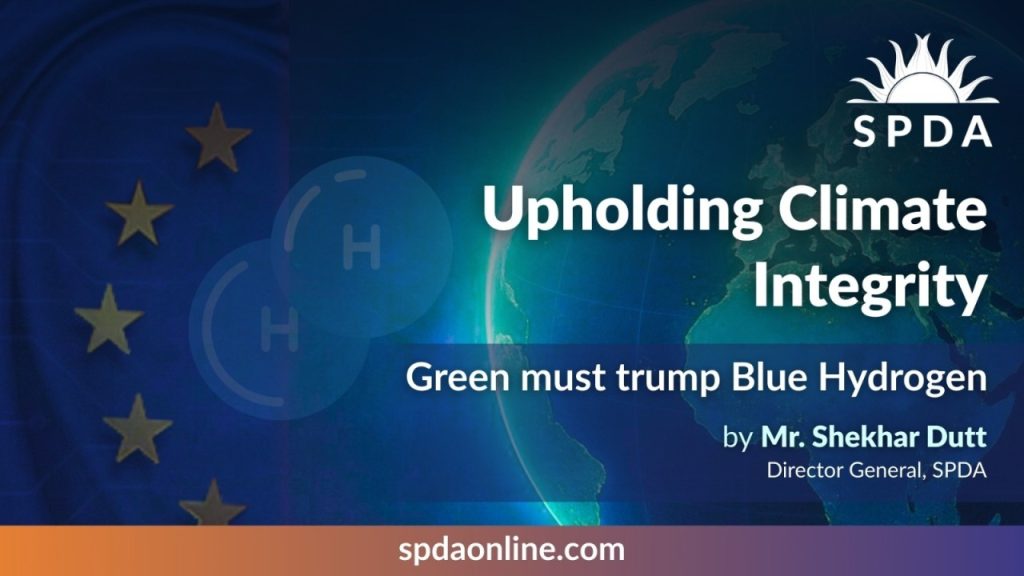In diplomacy, as in energy policy, clarity of purpose defines credibility.
As the European Union approaches its landmark decision on May 19, 2025, regarding the definition of “low-carbon hydrogen” under its Low Carbon Fuels Delegated Act, the eyes of the world are not just watching, they are taking notes.
This is more than a regulatory update. It is a litmus test of the EU’s climate leadership a moment to affirm whether policy will be led by evidence, or shaped by convenience.
Why This Moment Demands Moral Clarity
The draft legislation risks legitimizing blue hydrogen. A hydrogen derived from fossil gas with carbon capture and storage (CCS) as a low-carbon fuel. While the term sounds modern, the practice is deeply anchored in the past.
Let me be frank: blue hydrogen is not a clean alternative. It is a carbon compromise.
- Studies by Stanford and Cornell have shown blue hydrogen’s GHG footprint can be 20% higher than simply burning fossil fuels.
- Methane leakage, now estimated at 3.5% or more, obliterates any carbon advantage. Over a 20-year period, methane is 84 times more potent than CO₂ (IPCC, AR6).
- Carbon storage permanence remains largely unproven, and carbon capture itself is energy-intensive and fossil-fuel dependent.
- Even under ideal scenarios, the climate benefit of blue hydrogen is marginal, 9–12% lower emissions than grey hydrogen.
These aren’t abstract figures. They are real indicators of how climate integrity can quietly erode under the weight of industrial lobbying and technical ambiguity.
A Global South Perspective- Informed, Not Intimidated
As someone who has served at the highest levels of India’s national security and governance, I understand the tightrope of balancing development, energy security, and climate commitments. India is making a bold, difficult, and deliberate bet on green hydrogen, a path of resilience, rooted in sustainability.
What we need from the EU is not neutrality. We need leadership.
Because decisions made in Brussels are not just European. They shape policy blueprints from Delhi to Dubai, Seoul to São Paulo. If the EU blurs the lines now, it will export a flawed standard globally.
False Equivalence Hurts Innovation
If fossil-derived hydrogen is allowed to parade under a “low-carbon” banner, it will:
- Divert public funding from truly clean technologies.
- Create market confusion, discouraging long-term investments in green infrastructure.
- Reward inertia over innovation
This is not a question of inclusion. It’s a question of precision. If blue hydrogen is to be considered at all, it must be held to stringent, independently verified climate standards.
Not granted a free pass through offsetting gimmicks or self-reported emissions.
Call to the EU and to Conscience
To my friends, peers, and policymakers in the European Union: You have led before. On emissions standards, circular economy, and renewable targets, the EU has often shown the world what bold looks like. Now, you must do so again.
SPDA urges you to:
- Declare green hydrogen the global benchmark for clean energy transition.
- Support only technologies with verifiable, high-integrity emission performance.
- Reject accounting sleights like biomethane offsetting or blended fuels.
- Mandate site-specific, independent validation because trust cannot be outsourced.
In Closing a Word from the Global South
We, in the Global South, are not asking the EU to carry our weight. We are asking it to not undercut our ambition.
India and many like us are walking the harder path not because it’s easy, but because it’s right. We ask only that the global rules not reward shortcuts. Let’s not let fossil-based workarounds shape what should be the renewable renaissance of our century.
The EU’s hydrogen vote is not about classification. It is about climate courage.
The question is not whether the world is watching.
The question is what will it see?
Sources:
- Recharge News titled “Blue hydrogen ‘worse than gas for the climate’: landmark study’s damning verdict”
- https://www.smithsonianmag.com/smart-news/blue-hydrogen-20-worse-burning-coal-study-states-180978451/?utm_source=chatgpt.com
- Intergovernmental Panel on Climate Change (IPCC), Sixth Assessment Report (AR6), Working Group I, Chapter 7, Table 7.15.


